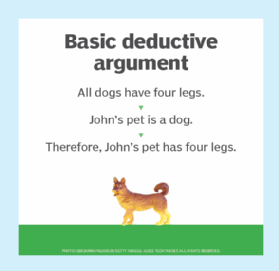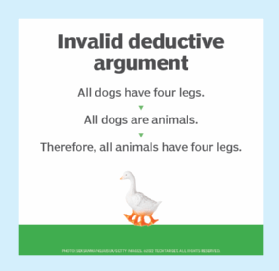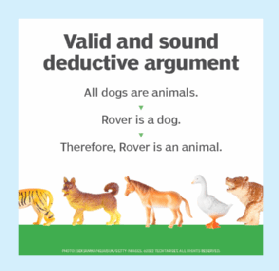deductive argument
What is deductive argument?
A deductive argument is a logic construct with two or more premises and a conclusion where if the premises are true then the conclusion must also be true. In philosophy, if the truth of the conclusion is fully established by the premises, then the argument is called valid. If the argument is valid and the premises are true, then the argument is called sound.

A deductive argument establishes a conclusion to be true by stating two or more true premises that lead to the conclusion being true. A deductive argument can be simply stated as "If A and B are true, then C must also be true." A deductive argument uses deductive reasoning. In a deductive argument the premises have a logical implication.
A simple example of a deductive argument is "All dogs have four legs, John's pet is a dog, therefore John's pet has four legs."
A syllogism is a form of deductive argument with two premises and one conclusion.
Validity and soundness of deductive arguments
A deductive argument is said to be valid if the truthfulness of the premises necessitates that the conclusion be true. A deductive argument is said to be sound if the premises are true.

Consider the following example: "All dogs have four legs, all dogs are animals, therefore all animals have four legs." This statement would not be valid because the two premises would not logically require the conclusion to be true.
As another example "All dogs have four legs, Rover is a dog, therefore Rover has four legs." This argument is valid in that if the premises were true, it would mean that the conclusion must be correct. But it is not sound because the premise "all dogs have four legs" is not true, because some dogs through misfortune do not have all their legs.
A good way to determine if an argument is valid and sound is to try to think of counter examples. If no counter examples to the premises can be found it is most likely a sound argument.
An example deductive argument that is both valid and sound is "All dogs are animals, Rover is a dog, therefore Rover is an animal."

Exercise caution when evaluating a deductive argument, because it may have true premises and lead to a true conclusion, but the logic is unsound so it is invalid and could cause problems if accepted. Consider "John owns a dog, Rover lives at John's house, therefore Rover is a dog." While those statements may be true, this same logic would lead you to believe that John is also a dog.
Deductive vs. inductive arguments
In philosophy, a deductive argument is contrasted with an inductive argument. Inductive arguments also have premises and a conclusion. The difference is that with a deductive argument, the conclusion must be true, and an inductive argument generally means that the conclusion is only probable. Inductive arguments use inductive reasoning.
An example of an inductive argument is "Most dogs have fur, Rover is a dog, therefore Rover has fur."
In an inductive argument, if the premises would logically lead to the conclusion, it is said that it is strong. If the inductive argument is strong and the premises are true, then it is said to be cognizant. This is like a deductive argument being valid and sound.
The exact distinction between deductive and inductive arguments is not fully accepted by all philosophers. Some may use a slightly different definition. Others believe that there is not a clear distinction between the two and that instead all arguments have different qualities that make this type of categorization difficult or meaningless.
See also: absolute truth, empiricism, Ockham's razor, automated reasoning, root cause analysis, scientific method
